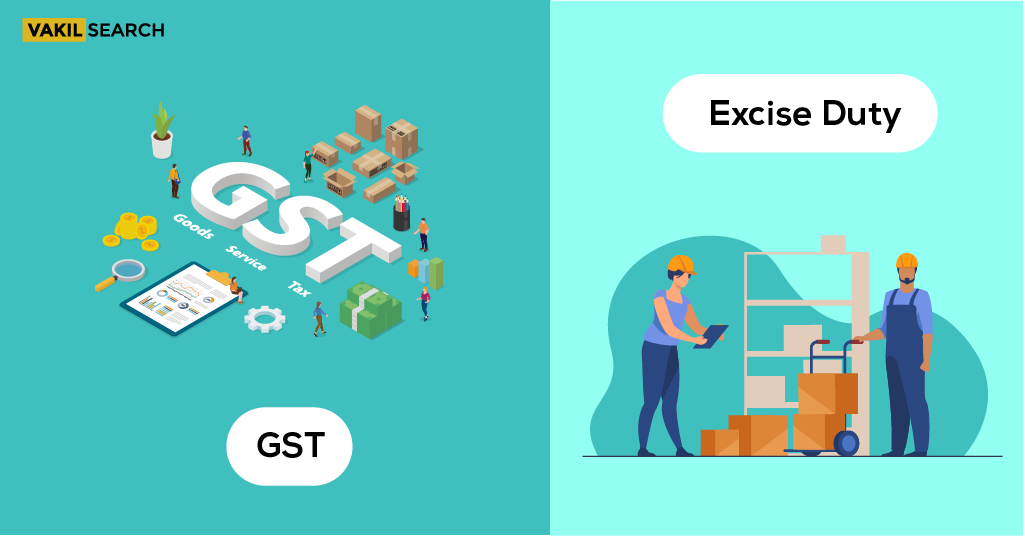A comprehensive article that explains the differences between GST and Excise Duty in India, including the impact on businesses and consumers, compliance requirements, and benefits
GST (Goods and Services Tax) and Excise Duty are indirect taxes in India, but there is a significant difference between the two. GST is a comprehensive tax on goods and services, while Excise Duty is a tax on the manufacture of goods. This article will discuss the difference between GST and Excise Duty, including their definitions, scope, and application process.
Defining GST and Excise Duty
GST is a tax levied on the supply of goods and services in India, except a few items such as alcohol for human consumption, petroleum products, and real estate. GST is a destination-based tax, meaning that the tax is levied where the goods and services are consumed rather than where they are produced.
On the other hand, Excise Duty is a tax levied on manufacturing goods in India. This tax is levied on the production of goods, not the sale. Excise Duty is a tax levied on specific goods, such as tobacco products, luxury goods, and other items considered harmful to society.
Scope of GST and Excise Duty
The scope of GST is much broader than that of Excise Duty. GST applies to all goods and services, with a few exceptions, whereas Excise Duty only applies to specific goods. GST applies to all transactions involving the supply of goods and services, including importing goods and services into India. In contrast, Excise Duty only applies to manufacture goods within India.
GST applies to goods and services, whereas Excise Duty only applies to goods. GST has replaced many indirect taxes in India, including Value Added Tax (VAT), Service Tax, and Central Sales Tax (CST), among others. In contrast, Excise Duty still exists as a separate tax.
GST Application Process
It is a straightforward and transparent process. Businesses can apply for GST registration online through the GST portal. The GST registration involves the following steps:
- Obtaining a PAN (Permanent Account Number)
- Obtaining a GSTIN (GST Identification Number)
- Filing GST returns
Once the GST registration process is complete, businesses must file GST returns monthly or quarterly, depending on their turnover. The GST returns must include details of all sales and purchases made during the relevant period and the tax paid on those transactions.
Excise Duty Application Process
The Excise Duty application process is slightly different from that of GST. The Excise Duty registration process involves the following steps:
- Obtaining a Central Excise Registration Number
- Filing Excise returns
Once the Excise Duty registration process is complete, businesses must file Excise returns every month, which must include details of all Excise Duty paid on the goods manufactured during the relevant period.
Use our GST percentage calculator to find out your GST. Easy, fast, and reliable online GST calculator.
Impact on Businesses
The implementation of GST has had a significant impact on businesses in India. GST has simplified the indirect tax system by replacing multiple taxes with a single tax, making it easier for businesses to comply with tax laws and regulations. This has also helped to reduce the tax burden on businesses, as they no longer need to pay multiple taxes on the same transaction.
On the other hand, Excise Duty has had a more limited impact on businesses. The Excise Duty applies only to specific goods and is levied at the time of manufacture. As a result, the impact of Excise Duty is limited to businesses that manufacture the goods subject to Excise Duty.
Compliance Requirements
GST has brought with it several compliance requirements for businesses in India. Businesses must register for GST, file monthly or quarterly returns, and keep accurate records of all sales and purchases. In addition, businesses must also pay GST on all supplies of goods and services, including imports.
The compliance requirements for Excise Duty are also significant. Businesses must obtain a Central Excise Registration Number and file Excise returns monthly. They must also keep accurate records of all Excise Duty paid on manufactured goods.
Benefits for Consumers
The implementation of GST has also positively impacted consumers in India. GST has reduced the cascading effect of taxes, meaning that the price of goods and services has gone down. This has made goods and services more affordable for consumers and has also helped to boost the Indian economy.
On the other hand, Excise Duty has had a limited impact on consumers. Excise Duty is levied on specific goods and is passed on to consumers through higher prices. This has made these goods less affordable for consumers, but it has also helped to discourage the consumption of harmful goods.
Conclusion
GST and Excise Duty are two different taxes in India with distinct scopes and application processes. GST is a comprehensive tax on the supply of goods and services, while Excise Duty is a tax on the manufacture of goods.
Businesses must be aware of the difference between these two taxes to ensure that they comply with all relevant tax laws and regulations in India. The GST application process is straightforward and transparent, while the Excise Duty application process involves obtaining a Central Excise Registration Number and filing Excise returns monthly. Vakilsearchcan provide comprehensive support throughout the GST registration process, ensuring compliance with legal and regulatory requirements and helping clients achieve their goals using GST.



